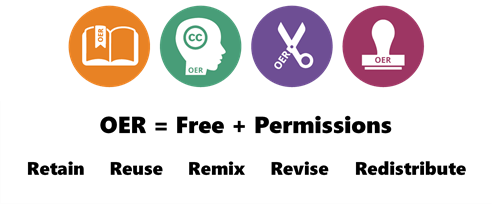Open educational practices (OEP) is "a broad descriptor of practices that include the creation, use, and reuse of open educational resources (OER) as well as open pedagogies and open sharing of teaching practices" (Cronin, 2017).
Temple University Libraries is committed to open educational practices in support of lowering the cost of higher education for our students, empowering faculty to gain agency over their course materials, and engaging students with open pedagogy.
To engage in open educational practices, you can:
Customize your resources and reduce barriers for students by creating, adapting, or adopting open educational resources (OER) or other zero-cost materials, such as library materials.
Engage students and collaborate by designing and implementing renewable assignments and other forms of open pedagogy.
Expand your knowledge and explore impacts by engaging in or reviewing open education research.
Adapted from Kwantlen Polytechnic University’s Open Education guide.

Open Educational Resources are "teaching, learning, and research resources that are free of cost and access barriers, and which also carry legal permission for open use. Generally, this permission is granted by use of an open license (for example, Creative Commons licenses) which allows anyone to freely use, adapt and share the resource—anytime, anywhere." (SPARC)
OER include:
They are multiple reasons why instructors should consider adopting OER as their course materials:
Too often faculty at higher education institutions are not aware of the existence of OER.
At Temple University, the Libraries is working to create more awareness around campus. Faculty across all disciplines who adopt OER and other zero-cost learning materials are recognized in the Libraries' Temple Open and Affordable Learning Materials Inventory (TOALMI).
TOALMI was created to document and share the adoption of zero-cost learning materials across the institution. Use the Inventory to identify faculty in your college or school who have adopted OER. Any Temple faculty member can add the zero-cost materials they have adopted to the Inventory by logging in with a Temple network account.

Temple faculty can apply for a Textbook Affordability Project (TAP) grant stipend that ranges from $500 to $1,500!

Email the Open Education Group at openeducation@temple.edu. We will consult with you or connect you to the right person, resource, or service on campus.
Kristina De Voe
English & Communication Librarian
devoek@temple.edu
Andrew Diamond
Administrative Specialist
adiamond@temple.edu
Courtney Eger
Learning and Engagement Librarian
courtney.eger@temple.edu
Maia Janssen
Bibliographic Assistant III
maia.janssen@temple.edu
Karen Kohn
Collection Analysis Librarian
karen.kohn@temple.edu
Ella Lathan
Assistant Director for Editorial
ella.lathan@temple.edu

Unless otherwise noted, original work in this guide is licensed under a CC BY 4.0 license.